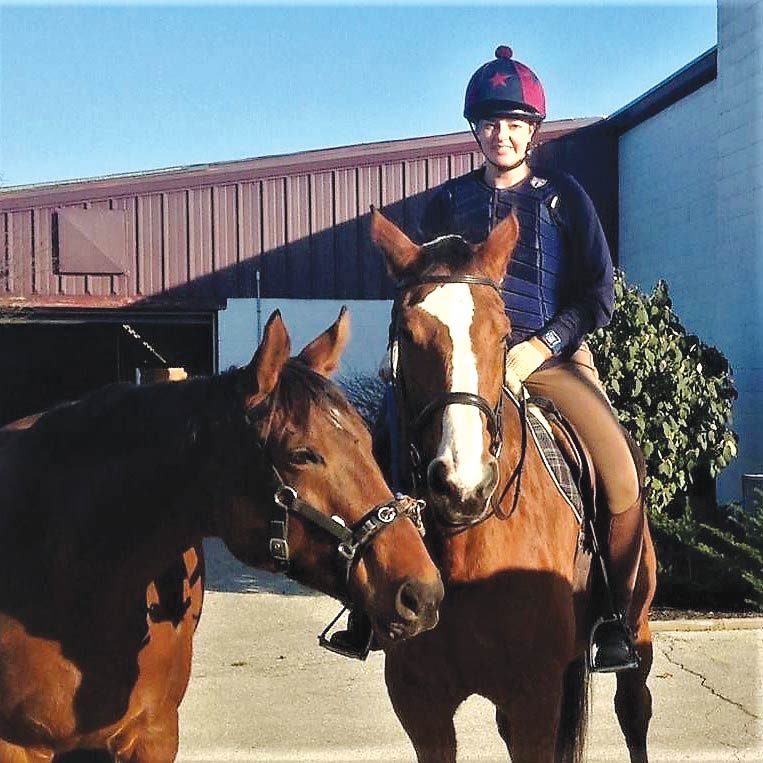 Liz Hanbridge and two of her rescued horses.
Liz Hanbridge and two of her rescued horses.
Representative Liz Hanbidge (D-Montgomery County) has introduced legislation aimed at providing a layer of protection for horses being sold at auction. HB 2193 amends legislation from 1983 which established licensing and regulation requirements for auctioneers who sell horses. Hanbidge’s bill would place additional regulations on these auctioneers. She says her bill is “an attempt to slow down the slaughter process.”
Hanbidge says that auctions have long been the first stop on a long, tortuous trip to Canadian or Mexican abattoirs where horses are slaughtered and sold to European and Asian consumers for food. Since 2007 it has been illegal in the United States to slaughter horses for human consumption. She says there are a lot of rescue groups, welfare agencies and others that have endorsed this bill because of its potential to save horses from the slaughter pipeline.
Her bill would require auctioneers to determine whether any horse scheduled for auction has a microchip, tattoo or brand. Any horse with such identifying markers would have to be advertised—along with a picture—on the auctioneer’s publicly-accessible website for 72 hours prior to sale.
“We don’t even have a website!” Ryan Kolb is part owner of New Holland Sales Stables. He has not heard about the bill, but he notes that it would profoundly complicate his life. “Half the horses are not even here for one day,” he says. “We’re not a boarding stable. We don’t want horses here for three days.”
The New Holland Sales Stables runs a weekly livestock auction. Kolb says that they sell anywhere from 80 to 200 horses at the Monday morning auctions. “Out of state horses come from Virginia, New York, Ohio, Maryland and New Jersey,” he says. “It’s a mix of everything—riding, driving, work horses and ponies.” Often owners of horses will pay drivers to transport their horses to the auction; so, they’re not even on the premises when their animals are sold.
“The bill is based on a bill that passed in New Jersey last year,” Hanbidge says. She says she’s encouraged by a lot of activity at the national level that indicates to her there are more and more people engaged in animal welfare and beginning to recognize the gruesome fates for horses sold to so-called “kill buyers.”
“There are different groups and different people working in various ways to make life better for horses in all walks of life.” She says that it’s sometimes difficult to get widespread support for bills that prohibit slaughter of horses. “You’d be surprised by the people who aren’t in favor of slaughter prevention because they think it’s a way to prevent people from starving their horses to death,” she says. “’Are you drying up that market (the auctions) to the extent that it puts horses in danger?’ they ask.”
She understands that the issues surrounding horse welfare are complicated and stubborn problems not likely to yield to one strategy. She believes there needs to be a humane pathway for owners to relinquish horses they can no longer afford to care for or horses that are no longer ridable. Her bill is not likely to accomplish that goal, though.
The HSUS recognizes that auctions are problematic, because they are often the venue of choice for owners who have neglected their horses. But that’s not the way it has to be. According to the HSUS website, auctions can be improved. “With the adoption of better state regulations and upgraded enforcement, owners will realize that they can no longer neglect their horses and expect to sell them at auction. Without a way to market these horses, unscrupulous dealers and owners will be driven out of the trade.”
The problem Kolb of New Holland points out is that his facility is not built to properly house horses for 72 hours or more until they can be sold. There is an on-site veterinarian on the day of the auction who checks the horses to ensure they’re healthy enough to sell. But Kolb and other auctioneers will likely have to make substantial changes if HB2193 becomes law.
He says that if Hanbidge’s bill passes, “we would just have to deal with it.” But he thinks that some people will just stop selling horses.
Hanbidge, who has been rescuing horses for years, says that she has been having conversations with representatives from both sides of the aisle in Harrisburg, trying to win bipartisan support for her bill. As a freshman legislator from the minority party, though, she knows it’s going to be a heavy lift to get the bill passed this year. “My expectation is that probably not this year but maybe next year it will pass.”




